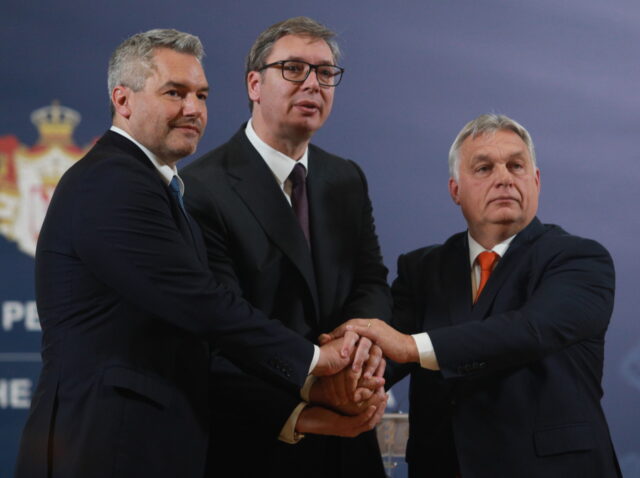Hungary, Austria, and Serbia have agreed to coordinate to reduce illegal migrant flows on the Balkan route, with Serbia deploying more police along its southern border and Austria providing reinforcements.
The three countries came to an agreement this week, with Serbia’s President Aleksandar Vucic announcing he signed a deal alongside Hungary’s Prime Minister Viktor Orban and Austria’s Chancellor Karl Nehammer that will boost the number of police on Serbia’s southern border.
Chancellor Nehammer also stated that Austria would provide a hundred police officers to help Serbia patrol its border and that the border forces would be equipped with various forms of surveillance gear, including drones, thermal vision cameras, and vehicles, the European Union-funded website InfoMigrants reports.
Prime Minister Orban, meanwhile, said that Hungary had prevented at least 250,000 attempts to cross its border with Serbia illegally this year, revealing that armed smugglers were organising along the border with Serbia in a situation he labelled “difficult.”
President Vucic of Serbia added that his country would be scrapping visa-free travel for nationals from Tunisia and Burundi — a move that has been urged by the European Union to tackle the number of migrants using visa-free access to enter the Balkan country, which unlike Austria and Hungary, is not an EU member-state, and then try to cross into the EU to claim asylum.
So far this year, the number of migrants who have travelled along the Balkan route to enter the EU illegally has increased by 1,689 per cent compared to the first ten months of 2021, with the EU border agency Frontex reporting over 22,300 illegal border crossing detections in October alone.
“So far this year, the Western Balkan region has registered the highest number of detections since the peak of the migration crisis in 2015. The high number of crossings can be attributed to repeated attempts to cross the border by migrants already present in the Western Balkans, but also to persons abusing visa-free access to the region,” the agency said.
This week’s meeting between the three central European countries comes after a first meeting last month in Budapest in which they agreed to strengthen and expand the border fence along the Hungarian frontier with Serbia.

COMMENTS
Please let us know if you're having issues with commenting.